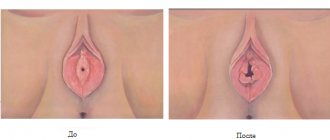Can you miss your period due to stress?
Psychosomatic illnesses are not as rare as they seem. Daily chronic stress, the impact of physical and emotional factors through very real physiological mechanisms are reflected in the functioning of organ systems.
For a woman, a regular menstrual cycle is an important indicator of health. Also, the female sex, due to upbringing, social and evolutionary reasons, is characterized by changes in mental state and swings in emotional mood. All this in combination increases the risk of late menstruation after stress.
The main symptom after stress is an increase in the time limits of the menstrual cycle. This means that your period may either start earlier or appear delayed. The duration of stress, as well as its intensity, directly proportionally influences the timing of the shift of “these days.”
In addition, women complain of general somatic symptoms:
- insomnia,
- headache,
- temperature,
- increased blood pressure,
- fatigue and low performance,
- shift in psycho-emotional state, hysteria,
- depressive moods.
Preventive measures
Prevention of missed periods is based on the same principles as treatment. To prevent the development of problems with the menstrual cycle, it is enough to:
- Minimize the level of stress factors.
- Get enough sleep.
- Do a hobby.
- Allow yourself active recreation in the form of swimming or yoga.
- Eat properly.
- Normalize your schedule.
Mechanism of stress influence
The absence of menstruation due to stress is associated with the mechanisms of neuro-humoral regulation of the woman’s body. From a physiological point of view, the functioning of the genital organs depends on:
- Works of the autonomic nervous system.
- Work of the endocrine glands.
The role of the nervous system in the displacement of the menstrual cycle
The uterus is an organ with a powerful muscular wall and abundant blood supply. The tissues of the uterus are innervated by hundreds of nerve fibers that regulate the ability of muscles to contract, as well as the narrowing and dilation of blood vessels and capillaries.
Therefore, disruption of the autonomic system leads to the early appearance of menstruation due to endometrial detachment due to the inability to “hold” it. So, the cycle becomes shorter and lasts 24-26 days, which can greatly worry a woman. The early appearance of blood, as well as a delay in menstruation, can be alarming, since there is a risk of bleeding and serious violations of the structure of organs.
Important! Physical activity is a common cause of early menstruation.
Physical stress combined with nervous disorders leads to a decrease in the menstrual cycle, so stress at work, going to the gym, country work, or simply increased physical activity during the day - all this can cause pathology.
This does not mean that you now need to limit yourself in physical development, but dosing loads is appropriate in any craft and activity.
Effect of prolactin
Due to stress, there may be a delay in menstruation due to incorrect functioning of the endocrine system. The dominant position in the regulation of biorhythms is occupied by sex hormones, namely prolactin, progesterone, and estrogens.
The occurrence of nerve impulses that occur during stress stimulate the production of prolactin by pituitary cells. The pituitary gland is an endocrine gland that regulates most organs of the endocrine system. Disruption of the pituitary gland leads to a persistent imbalance of the genital organs in a woman’s body and, as a consequence, to a delay in menstruation.
A physiological increase in the concentration of prolactin is observed during pregnancy, when, together with progesterone, both hormones inhibit the appearance of menstruation, promote attachment of the fetus to the wall of the uterus, and during lactation they help stimulate milk synthesis.
Reviews
Bozhenova Inna Vladimirovna, 24 years old, Voronezh I generally had continuous periods lasting 3 months. Hundreds of doctor visits, dozens of ultrasounds, a bunch of tests - they didn’t find anything wrong with me. I was healthy! The doctor said it was all due to stress. I then fell in love with a guy, and he left me. Typical women's story. This is probably why I am immune to feelings: the body’s protective reaction from stress. Novikova Svetlana Konstantinovna, 22 years old, Moscow “My periods started earlier due to stress,” the doctor told me during the examination. Maybe it's because I got divorced, because then I was really worried. But I know that most often there is a delay in menstruation. So, my friend had a delay of about a year due to stress due to the death of her father. Oh, how it does have a big impact on your health.
How does stress affect your periods?
Stress is a generalized name for all situations, external factors and conditions that go beyond a person’s usual comfort zone. These changes can be both unpleasant and pleasant:
- lack of sleep;
- emotional overload;
- anxiety about an upcoming wedding, performance, exam, moving;
- conflicts at work, with friends, in family;
- strict diets, fasting;
- physical or intellectual exhaustion, overwork;
- climate change.
Stress causes emotional and psychophysiological tension. The activity of the hypothalamus and pituitary gland, the parts of the brain that are responsible for the production of female hormones, changes. The severity of stress depends solely on the woman’s perception, her stability and sensitivity.
Menstruation and stress are directly related: the stronger and longer the emotional shock, the longer the cycle is delayed. A single shock causes a delay of 2-5 days, chronic stress can cause amenorrhea, which lasts for years.
The answer to the question why menstruation is delayed under stress is that a woman finds herself in a situation that she cannot cope with in the usual ways, because of the search for a solution, tension and anxiety arise, the body responds to danger by increasing the level of hormones that awaken strength and aggression , endurance. The goal of the organism is to survive. The function of childbearing fades into the background, the level of female hormones drops.
How many days of delay are considered normal?
The duration of the delay directly depends on the magnitude and regularity of the emotional shock. Usually there are no periods for about 5 days, then the discharge comes on its own, without drug therapy. This period may be increased or decreased. In rare cases, periods shift by 30 calendar days, that is, the duration of one cycle is 56-64 days.
The delay period depends on the individual characteristics of the body and its ability to withstand emotional overload. Usually a woman needs a couple of days of rest to put her nervous and hormonal system in order. There are often cases when it is not possible to cope with the problem on your own. In such a situation, the help of a psychologist is necessary, otherwise depression may begin due to nervousness, which will lead to amenorrhea - the complete loss of menstruation.
What should you do if you miss your period due to stress?
First of all, you need to make sure there is no pregnancy. A diagnostic test and consultation with a gynecologist will help with this. If there is no pregnancy, then to normalize menstruation it is necessary to restore mental balance. Taking hormonal drugs and stimulating the cycle in this case is used as an auxiliary method. It is important to increase stress resistance and strengthen the body’s nervous system so that the condition does not become chronic and stress does not turn into depression.
How to get your period back:
- Find the cause of anxiety, cope with psychological trauma, change your lifestyle and living conditions.
- Relax, relax in an affordable and favorite way. This could be taking a warm aromatic bath, shopping, meeting with friends, meditation, yoga, a weekend in nature. You need to use everything that brings more positive emotions.
- Observe the regime of work, rest, sleep. During periods of stress and disruption of the menstrual cycle, eight hours of sleep is of particular importance: melatonin (sleep hormone) is produced, which neutralizes cortisol (stress hormone). The optimal time for going to bed is 10-11 o'clock in the evening, for getting up - 6-7 o'clock in the morning.
- Watch your diet. The diet should be balanced: a lot of protein, a little less complex carbohydrates, a lot of fiber (vegetables and fruits), and drink plenty of fluids. It is necessary to exclude canned food and semi-finished products, reduce sugar consumption. But it is allowed and healthy to eat honey. It is not recommended to starve or limit yourself to your favorite foods. Diets do not cause positive emotions and provoke an additional increase in cortisol levels.
- Find a hobby that replenishes energy reserves: cooking, reading, music, theater, dancing, sports, creativity.
- Use aromatic oils. They can be added to water, sprayed around the room, dripped onto the wrist instead of perfume, or used for self-massage. Lavender and anise oil help with stress.
- Take a course of vitamins. Magne B6 and Complivit restore the nervous system well and have a positive effect on women’s health, in particular the functioning of the reproductive system.
Calming the nervous system
The absence of menstruation due to stress is not a pathology; you can cope with it yourself. Here's what to do in such a situation:
- Take a break for yourself. There are many options here - to suit any opportunity and budget (a weekend trip to the mountains, time off from work, shopping, a delicious dessert, a warm bath).
- Add more positive emotions to your life: arrange a meeting with friends, a romantic date with your loved one, or invite your parents to dinner.
- Ensure quality sleep of at least 8 hours a day. Sometimes, to restore the cycle, it’s enough just to get some sleep; you can devote the next weekend to this.
- Monitor your nutritional intake. It should be balanced, contain a lot of vegetables and fruits, as well as the required amount of protein. Strict diets and strong restrictions are not allowed.
- Visit a psychologist who will help you cope with stress as quickly as possible.
- Learn to meditate and start doing yoga regularly. These ancient practices help keep your emotional state in balance.
- Find a hobby you like. It is very useful to have an outlet, something that will charge you with energy and restore peace of mind. For those who like to be alone with themselves, reading books, cooking, any handicrafts (macrame weaving, embroidery, knitting, sewing) are suitable, for those who prefer an active pastime - dancing, group aerobics training, skiing, skating rink, go-karting.
When your periods have disappeared due to stress, it is useful to take a course of vitamin preparations to generally strengthen the body (Supradin, Complivit) and the nervous system (Magne B6, Berocca). You can turn to traditional medicine. Infusions of soothing herbs will come to the rescue:
Herbs can be purchased at the pharmacy either individually or as part of sedative mixtures.
Here are some useful recipes:
- Pour 1 tbsp. l. valerian rhizomes into a saucepan, pour a glass of cold water, bring to a boil, reduce heat and boil for 30 minutes. Cool the resulting broth, strain and take 1 tbsp. l. three times a day for 10 days.
- Pour one spoon of St. John's wort herb into 300 ml of boiling water, leave for 2 hours and take 30 minutes before dinner.
Medicinal herbs can also be used for bathing. You need to brew 50–100 g of herbs with 1 liter of boiling water and leave for an hour or more, strain the resulting product and pour it into a warm bath (37 degrees).
The water procedure lasts about 20 minutes; it is most beneficial to do it before bed. The duration of the course is 10 days.
Aromatherapy is a good helper in the fight against stress. To do this, use a special aroma lamp or add a couple of drops of essential oil to the device to humidify the air. Aroma candles are well suited for this purpose.
In the absence of any of the above, you can drop essential oil into a glass of boiling water or onto a cotton pad and place it at the head of the bed. Products based on lavender, lemon balm, and mint are well suited for relieving nervous tension.
How to get your period back after stress?
Herbs will help restore menstruation: lemon balm, St. John's wort, chamomile, rosemary, valerian, motherwort or a ready-made pharmacy soothing mixture. They can be used externally and taken orally:
- warm baths with the addition of broth;
- chamomile and lemon balm tea;
- salad with parsley and rosemary.
The effect of the baths will be stronger if you complete a course of 10 procedures. The duration of one session is 20 minutes. Water should correspond to body temperature. It is advisable to carry out the procedure before bedtime.
If your cycle is delayed for more than a month, you should consult a doctor. He will conduct a comprehensive examination, take tests for hormones, and examine the condition of the uterus, ovaries, and brain. Based on the data obtained, the specialist will make a diagnosis, and if the cause is not related to gynecology, he will refer you to a psychotherapist.
In addition, consultation is necessary if your periods are abnormally heavy, discolored or scanty. Any changes in discharge may indicate pathology of the female organs.
“Fitosedan” is a drug based on natural herbs to restore the psycho-emotional state
This is an excellent drug for relieving stress and normalizing sleep, the use of which on a regular basis helps restore the cycle. If the reason for the delay in menstruation is stress, and in addition to this, all other health factors are normal, then the next menstruation should come on time.
“Phytosedan” is a package containing 20 filter bags. You should brew them like regular tea and take half a glass before each meal.
The drug contains the following active ingredients:
This drug does not cause either drug or psychological dependence. People with sleep disorders can safely take it, since insomnia is one of the direct indications for taking Phytosedan.
How does stress affect your periods?
Stress is a natural reaction of the body in response to various unfavorable factors. In the life of a modern woman it is not only hunger, cold and hard physical work. Increasingly, other aspects are playing a role. Difficult relationships with your spouse and other relatives, failures at work, failure of your favorite gadget or car breakdown - all this leads to a deterioration in mood and puts you in a state of stress. The stronger the experience, the greater the load on the nervous system. As a result, the body cannot cope with the situation and fails - and various health problems arise.
The female reproductive system is one of the first to respond to stress. Nervous shock negatively affects brain function. The production of hormones from the pituitary gland and hypothalamus is disrupted. The ovaries suffer, in which the synthesis of estrogen and progesterone is disrupted. Due to stress, hormonal levels change, and a delay in menstruation may occur.
There are two groups of factors influencing the psycho-emotional state of a woman:
- Regular emotional stress. This could be difficult relationships in the family or at work, as well as any unfavorable situations that last for months or years. The load on the nervous system increases if a woman also engages in heavy physical labor.
- A strong but short-term shock. Any tragic events in which a woman becomes a participant or witness can lead to disruption of her well-being.
What to do if your period is delayed due to stress?
If your period disappears for a long time or does not come on time, you need to consult a doctor. It is important to exclude pregnancy and pathology of the pelvic organs. Only in the absence of other obvious reasons for the cycle failure can we talk about the effect of stress on a woman’s body.
- Gynecological examination.
- General clinical blood and urine tests.
- Pregnancy test and/or hCG blood test.
- Blood test for hormones.
- Screening for sexually transmitted infections.
- Ultrasound of the pelvic organs.
Additionally, aspiration biopsy of the endometrium, hysteroscopy, laparoscopy may be prescribed - according to indications.
Opinion of gynecologists
Having your period ahead of schedule is a fairly common occurrence in modern times. This can be caused by many factors, the most common being serious illnesses, possible age-related changes or indiscriminate use of oral contraceptives. You should not panic and immediately go to the hospital if your period comes ahead of schedule; however, it is best to contact your attending physician and discuss this issue with him. This is especially important when such a phenomenon becomes constant and appears from time to time.
Remember that only systematic monitoring of your body, consultations with specialists, tests and visits to doctors make it possible to timely identify a possible disease and prescribe treatment. Without these conditions, any drug taken independently can only harm the female body.
Related posts:
- Drowning: state of the problem Drowning is a process of respiratory failure due to immersion...
- Lymph nodes on the legs: symptoms Lymphadenitis is inflammation of the lymph nodes in a person caused by a reaction to a serious...
- Dengue fever Dengue fever is a natural focal infection caused by arboviruses of the same name and occurs…
- What diseases do ticks carry? The active period of ticks begins in the spring and ends only in the fall. Peak…
How to get your period back after stress?
- Solving the main problem. It is important to understand why menstruation might have disappeared and what affected the woman’s health - relationships with relatives, the situation at work, financial troubles, etc. After eliminating the traumatic factor, the menstrual cycle is restored.
- Sleep and rest mode. Night sleep should be at least 8 hours, daytime rest - as needed.
- Physical activity. When stressed, yoga, water aerobics, and running are recommended. Any sport that will allow a woman to take her mind off pressing problems will be beneficial.
- Balanced diet. It is important to follow a meal schedule and add foods rich in all essential nutrients to the menu.
- Taking vitamins. Multivitamin balanced complexes (taking into account age) will be beneficial.
- Hobby. Favorite activities help you relax. An exciting hobby will help you forget about problems and switch your attention to other tasks.
- Communication. Meeting friends and visiting relatives, walking in good company, and traveling will be beneficial.
- A change of scenery. If possible, it is worth taking a vacation. Two weeks of proper rest away from your usual worries relieves nervous tension and promotes recovery.
After breaking up with my boyfriend, I couldn’t come to my senses for two weeks. She refused to eat and did not leave the house. Now it’s gone, but another problem has arisen - my periods have disappeared. I took a test - negative. I think this is due to anxiety. How many days can a period be delayed due to stress and when will the cycle be restored? Olga, 19 years old.
The duration of a missed period under stress is impossible to predict. Absence of menstruation for up to 1 month is allowed. If after this period the situation does not return to normal, you should consult a doctor.
Sources:
https://boleznimatki.com/ginekologiya/mozhet-li-stress-povliyat-na-mesyachnye.html https://eustress.ru/stress/zaderzhka-mesyachnyh-iz-za-stressa https://ginekolog.guru/ mozhet-li-iz-za-stressa-byt-zaderzhka-mesyachnyx/









